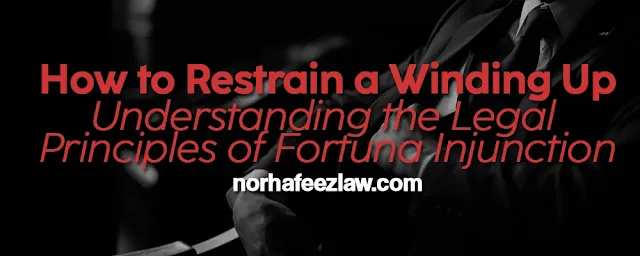How to Restrain a Winding Up - Understanding the Legal Principles of Fortuna Injunction.
Have you heard of the Fortuna injunction? If not, you might be interested to know that it is a powerful legal remedy that can protect companies from abuse of process and irreparable harm.
Named after a landmark 1978 case, the Fortuna injunction can be used to restrain the presentation of a winding-up petition in court. But what are the legal principles that warrant the grant of a Fortuna injunction?
In this article, we explore the answer to that question and delve into several cases that shed light on this important topic. If you're a company owner, keep reading to learn more about this crucial legal tool and how it might apply to your situation.
1. A Fortuna injunction is a type of legal injunction that can be used to restrain the presentation of a winding-up petition in court.
2. It is named after the 1978 case Fortuna Holdings Pty Ltd v. The Deputy Commissioner of Taxation of the Commonwealth of Australia [1978] VR 83, which established the principle that presentation of a winding-up petition may be restrained by injunction where its presentation would amount to an abuse of the process of the court.
3. We now shall delve deeper into the legal principles that warrant the grant of a Fortuna injunction, as elucidated in the following cases:
(i) Fortuna Holdings Pty Ltd v. The Deputy Commissioner of Taxation of the Commonwealth of Australia [1978] VR 83
4. In Fortuna Holdings, the court established that the presentation of a winding-up petition may be restrained by injunction where its presentation would amount to an abuse of the process of the court.
5. This principle enables companies to be protected from threatened or apprehended oppression and damage from abuse of court process.
6. The first branch of the principle applies in cases where the presentation of the petition might produce irreparable damage to the company and where the proposed petition has no chance of success.
7. The second branch applies in cases where a petitioner proposing to present a petition has chosen to assert a disputed claim, by a procedure which might produce irreparable damage to the company, rather than by a suitable alternative procedure.
(ii) Mobikom Sdn Bhd v. Inmiss Communications Sdn Bhd [2007] 3 CLJ 295; [2007] 3 MLJ 316
8. In Mobikom, the court explained the two branches of the principle that guide courts in the grant of an injunction.
9. The first branch applies to cases where the petitioner is incapable of success as a matter of law or through absence of supporting evidence.
10. Where the petitioner is not entitled to present a petition or where the ground alleged is not a ground which can found a winding-up order, the petition is incapable of success as a matter of law.
11. It is important to note that this principle is not applicable to cases where the respondent has obtained a valid and enforceable judgment against the company and the cases where the intended petition, if filed, is not bound to fail, and the company has a good chance to succeed.
12. In conclusion, the Fortuna injunction provides companies with a powerful
tool to protect themselves against abuse of process and irreparable
harm.
13. However, obtaining this injunction is not without its risks and
should be pursued judiciously after seeking legal advice and considering
all the practical implications.
14. The legal principles guiding the grant
of a Fortuna injunction, as elucidated in the cases discussed above, can
be complex and nuanced, and it is essential to work hand in hand with your legal counsel to navigate this terrain effectively.
15. Ultimately, with the
right approach and guidance, the Fortuna injunction can provide
much-needed protection and peace of mind to companies facing challenging
legal situations.
SUMMARYFortuna injunction is a legal remedy that restrains the presentation of a winding-up petition in court where its presentation would amount to an abuse of the process of the court. The principle enables companies to be protected from threatened or apprehended oppression and damage from abuse of court process. The two branches of the principle that guide courts in the grant of a Fortuna Injunction are: (i) where the presentation of the petition might produce irreparable damage to the company and where the proposed petition has no chance of success, and (ii) where there is a more suitable alternative means of resolving the dispute involved in a disputed claim against the company.
____________________
Disclaimer: This article is published for the purpose of awareness and general knowledge. Any part contained in this article should not be considered as a guide to initiate legal action independently without first consulting an experienced lawyer.
For any further information regarding this article or to schedule a legal consultation session, you may contact your preferred lawyer, or you may reach us via WhatsApp by clicking the yellow image above. Note that the information in this article is accurate at the time of publication and may be subject to change without notice. We will not be liable for any action or failure to act taken based on the information contained in this article.







0 Pertanyaan & Jawapan
Anda mempunyai sebarang pertanyaan? Tanya saya di sini atau whatsapp saya dengan klik butang whatsapp di skrin atau isi borang pertanyaan.